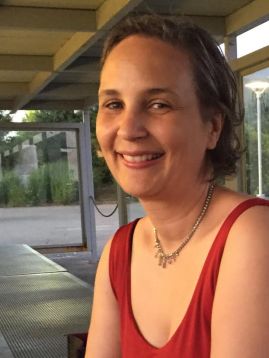Women Who Submit: How would you describe your city and your local literary
community?
Kirsten Major: New York is a big-little city. We are 8 million in number, but the literary scene is small–everyone is about 1 person away from everyone else. Sharing air with literary giants is not uncommon. The five boroughs, plus Jersey City, plus Long Island reading scene is endless. My fantasy day job would be to be the Bill Cunningham of the literati, on my bike every night with a camera around my neck, on my way to a reading somewhere to take pictures of my world.
WWS: How did you hear of Women Who Submit, and why were you drawn to start a WWS chapter in your area?
KM: It just gets so. Darned. Hard. To keep putting yourself out there. Leland Cheuk, who wrote The Misadventures of Sulliver Pong, has written about this beautifully, persevering in the face of unstinting rejection. And also, it is mighty easy to have dedicated writing time co-opted by sending my work out if I haven’t in a while. Above all, it’s lonely. I am pretty active on Twitter so one day I put it out there, “Is there any one who knows if there are submissions parties? Is this a thing?” And someone sent me the WWS Twitter handle and I thought, that’s for me. It was absolutely key that Ashaki Jackson, co-founder, had a training session, coached me about attracting people and then worked her own NYC-based network of poets at Cave Canem,to help me get started. The national organization has supported me at every level and that keeps me going.
WWS: What personal experiences are you hoping to bring to the table as the chapter lead?
KM: I am good at pitching, and it is fun to help people with their letters. I am super grateful that long-time, literary friend, Laura Catherine Brown, is generally there and people witness her counseling me out of moments where I am so frustrated and down.
WWS: What can people expect to find at a WWS-NYC submission party?
KM: First, ease of location and a great environment. We are extremely fortunate that Joy Parisi, owner of Paragraph: Workspace for Writers, lets us use their café space for our gatherings, and she also donates snacks. Expect playwrights! I’m thrilled that we have a playwriting contingency in the group. Expect help proofreading. Expect that if you ask about where to send your stuff you’ll get some new resources. We are people of color, people from the LGBTQIA community, and welcome all.
WWS: What specific submission barriers do the writers in your chapter face and what ways is your chapter addressing them?
KM: I think we encompass a range of challenges: I’ve been doing this too long for too little, and I am soooo bitter; some people are starting out submitting work for the first time and need to know what goes in a submissions letter, some of the playwrights are facing some bald-faced straight-up sexism. We share, we talk. My dream is to get this thing going enough so that we can start keeping track of our submissions and really start making a public statement about what we all actually know: that it’s not just women aren’t submitting enough to top tier publications; about women’s voices are seen as a non-normal, alternative literary voice. I do want to shout out though to my menfolk colleagues, Rob Skidmore and Gordon Haber–writers whom I admire and who have done tremendous work, and haven’t gotten the audience their achievements deserve. Men struggle too. That’s why men are always invited to our WWS parties.
WWS: Do you have any submission success stories to share? (This can be submission numbers, acceptances, publications, personal rejections, a well-attended party, etc.)
KM: For me, (privately, I hope) I pour all my frustrated maternal energies into the joy of seeing our participants make strides. When one of our playwrights said, “I just sent this thing out, I don’t know why it seemed so hard, it was actually easy” and there was this lightness about her, I felt my chest crack with joy. When people say, “I sent five things out” I cheer out loud. We had a parent there last time who carefully planned childcare time to come and devote a few hours to getting her work out there. I was watching her work diligently and my heart was just glowing. This is success.
Personally, my biggest proudest story is when I took four hours to submit one thing–a package of short stories and novel excerpt to And Other Stories, a press in the United Kingdom. I had to select excerpts, edit and print. Then write a submissions letter, print, edit, and print again. The process was everything all writers say about the mystery of submitting work, which is what should take minutes in reality takes hours. I addressed my little package and took it to the post office that is open late on Saturdays, the huge old famous one on 34th Street, stood in line and sent it off to England. It was fall twilight and I walked up and down those grand New York City steps that span a city block and I felt like that Sylvia Plath line in The Bell Jar: that proud “old brag of my heart: I am, I am, I am.”
 Kirsten Major is a writer who lives in New York City. Some of her writing is posted at https://catapult.co/kirstenmajor/stories.
Kirsten Major is a writer who lives in New York City. Some of her writing is posted at https://catapult.co/kirstenmajor/stories.

